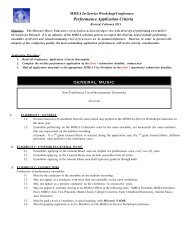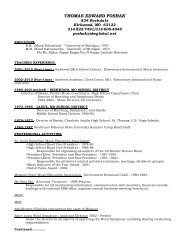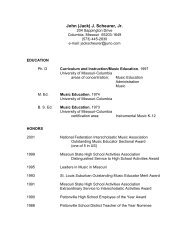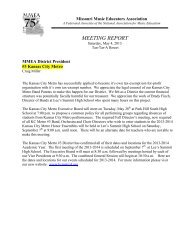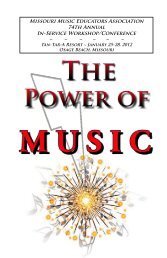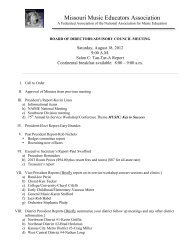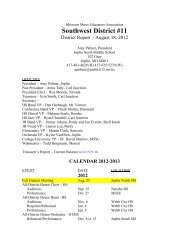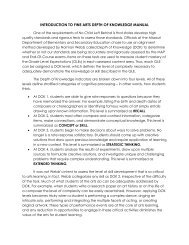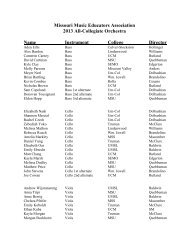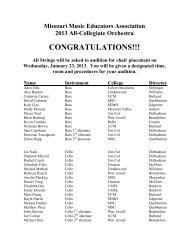Full Program - Missouri Music Educators Association
Full Program - Missouri Music Educators Association
Full Program - Missouri Music Educators Association
Create successful ePaper yourself
Turn your PDF publications into a flip-book with our unique Google optimized e-Paper software.
Lindsey Williams joined the music education faculty of the Conservatory of <strong>Music</strong><br />
and Dance in Fall 2006. Williams earned his bachelor’s and master’s degrees from<br />
the University of Kansas and his doctoral degree from Florida State University. At<br />
the Conservatory, Dr. Williams teaches undergraduate and graduate courses in music<br />
education, teaches and guides graduate research, and coordinates music education<br />
field experience placement and supervision, and coordinates the Interdisciplinary PhD<br />
program for the Conservatory.<br />
Dr. Williams’ teaching experience includes elementary through high school instrumental<br />
and choral music, and he has served in various leadership roles within professional<br />
music organizations. Dr. Williams is also the conductor of the New Horizons Band.<br />
Williams is an active performer, conductor and clinician for music educators and young<br />
musicians throughout the United States and Southeast Asia.<br />
A respected researcher, his interests include musicians’ focus of attention, musical<br />
complexity, life-long learning and music teacher training. He currently serves as coeditor<br />
for the “<strong>Music</strong> Journal of Southeast Asia” and on the editorial board for the<br />
“<strong>Missouri</strong> Journal of Research in <strong>Music</strong> Education.” He has presented research at<br />
state, regional and national conferences of NAfME and the American <strong>Music</strong> Therapy<br />
<strong>Association</strong> and has been published in peer-reviewed journals including the “Journal<br />
of Research in <strong>Music</strong> Education,” “Update: Applications of Research in <strong>Music</strong><br />
Education,” “Contributions to <strong>Music</strong> Education,” “<strong>Missouri</strong> Journal of Research in<br />
<strong>Music</strong> Education,” and “Research Perspectives.”<br />
. “<strong>Music</strong> Education Advocacy: It’s a Marathon, Not a Sprint” (p. 28)<br />
In the current economic setting, music educators may find themselves concerned with not only the<br />
vibrancy of their programs, but also its possible survival. We must teach the value of music beyond our<br />
classrooms and schools. Therefore, it is vital that we, as music educators, strive to educate not only our<br />
students, but parents, administrators, colleagues, and communities of the value of music as an independent<br />
area of study. Participants will leave with an understanding of the advocacy process and how they<br />
can actively participate in these efforts. Advocacy starts at “home.”<br />
Steve Williams is the elementary music teacher at Hancock Place Elementary<br />
School in St. Louis. Formerly, he was the consultant for Fine Arts and Health/Physical<br />
Education at the Department of Elementary and Secondary Education. He graduated<br />
from CMSU in May of 1989, earning a bachelor of music education degree. He also<br />
earned the newly-implemented bachelor of music in jazz composition, the first student<br />
at the university to earn that degree.<br />
He has taught music at every level from kindergarten general music through university<br />
band. After teaching in St. James and Lexington, he attended UM-C, where he<br />
earned a master’s degree in curriculum and instruction with an emphasis in wind<br />
conducting. In 2000, he was one of only 7 graduate students inducted into the Rollins<br />
Society, which recognizes campus-wide involvement and academic and teaching<br />
achievement.<br />
Mr. Williams taught Instrumental <strong>Music</strong> at Rock Bridge High School. While in<br />
Columbia, he was appointed Performing Arts department chair and worked extensively<br />
to develop and refine the curriculum. In 2001 he was named by School Band and<br />
Orchestra Magazine as one of “50 Directors Who Make a Difference,” representing<br />
the state of <strong>Missouri</strong>.<br />
95



